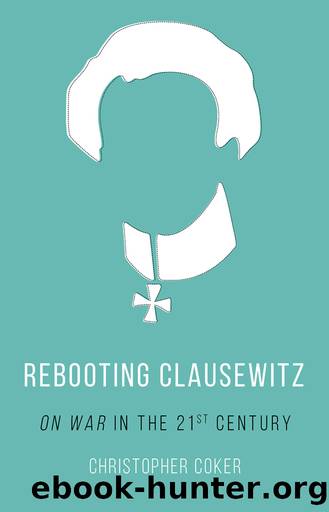Rebooting Clausewitz by Christopher Coker

Author:Christopher Coker
Language: eng
Format: epub
Publisher: Oxford University Press
Published: 2017-06-15T00:00:00+00:00
Losing small wars
So Clausewitz was inescapably Eurocentric, but it doesnât follow that his work has nothing to say about the conflicts and confusions of our own age. One of the many criticisms levelled against him is that he has little to say about the wars we now fight against insurgents, jihadists, terrorists, or other politically motivated non-state actors. In fact he was one of the very first theorists of national liberation wars. Read his âLectures on Small Warsâ, which he delivered at the War School in Berlin in 1811â12 or the famous 1812 Memorandum in which he looked forward to a war of liberation in Germany itself. Or read the chapter on âThe People in Armsâ in the sixth book of On War. These have been brought together by Christopher Daase and James Davis (Daase and Davis, 2015). At one time it was thought that had he lived Clausewitz would have brought out a companion volume on guerrilla warfare, though many historians now doubt this.
Unfortunately, the small wars of his day are not much remembered by students. They are a part of a history that is at once totally obscure and at the same time broadly familiar because they took place against the backdrop of the great battles students have heard of. Of all Napoleonâs âother warsâ the most significant was the insurgency in Spain. When we compare it with Americaâs experience in Iraq (2003â9) the parallels are both disturbing and illuminating. To begin with, historians have begun to see the Spanish insurrection as Europeâs first religious war since 1648. An English observer at the time attributed the reluctance of the Spanish to surrender to the fact that their priests persuaded them to continue the fight to the bitter end: âprocessions, miracles, prophecies, as well as the distribution of relics and the appointment of saints to the command of armies fanaticised the mass of patriotsâ (Haythornwaite, 1996, 119). In this most terrible of conflicts the Enlightenment encountered an age people thought had been consigned to history. Other historians take a different view and see the insurrection as no more than âtax-resistant brigandageâ (McLynn, 1997, 454). With its ethos of xenophobia and taste for atrocity it left a baleful legacy that some say would eventually resurface in the Spanish Civil War a hundred years later (Broers, 2010, 106).
Napoleon, of course, knew what a bandit was, and he knew the difference between a bandit and a freedom fighter (his own father had been one of the latter). Banditry and guerrilla warfare were bound together from their inception. In Corsica and in Spain they were joined at the hip. As Charles Esdaile writes, honour killings and the culture of the vendetta were held in as high esteem as patriotism, and patriotism was often just a means of revenging the dead by proxy (Esdaile, 2004, 100â101), And French intervention, not only in Spain but in the Balkans and Italy, created opportunities for social outsiders that had not existed before (Broers, 2010, 17). Napoleonâs âlittle
Download
This site does not store any files on its server. We only index and link to content provided by other sites. Please contact the content providers to delete copyright contents if any and email us, we'll remove relevant links or contents immediately.
| Automotive | Engineering |
| Transportation |
Machine Learning at Scale with H2O by Gregory Keys | David Whiting(4313)
Never by Ken Follett(3957)
Urban Outlaw by Magnus Walker(3395)
OPNsense Beginner to Professional by Julio Cesar Bueno de Camargo(3288)
Sapiens and Homo Deus by Yuval Noah Harari(3071)
Will by Will Smith(2920)
A Short History of Nearly Everything by Bryson Bill(2698)
Hooked: A Dark, Contemporary Romance (Never After Series) by Emily McIntire(2554)
Rationality by Steven Pinker(2364)
Borders by unknow(2315)
The Becoming by Nora Roberts(2202)
Holy Bible (NIV) by Zondervan(2125)
A Short History of War by Jeremy Black(1848)
HBR's 10 Must Reads 2022 by Harvard Business Review(1844)
The One Percenter Encyclopedia by Bill Hayes(1826)
Freedom by Sonny Barger(1801)
Go Tell the Bees That I Am Gone by Diana Gabaldon(1758)
A Game of Thrones (The Illustrated Edition) by George R. R. Martin(1745)
Five Ways to Fall by K.A. Tucker(1742)
